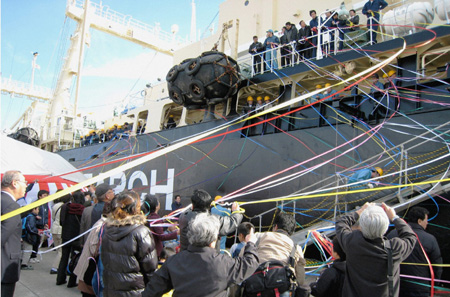People bid farewell to crew members of Nisshin Maru, the 8,000-tonne flagship of Japan's whaling fleet, as they leave for an expedition from Shimonoseki port, southwestern Japan Nov. 18, 2007. The ship is leading a fleet for an expedition activists say will for the first time target humpbacks, a perennial favourite among whale-watchers.
The Japanese government announced on Friday to suspend humpback whaling in response to the International Whaling Commission (IWC)'s proposal, but insisted that the country's overall whaling program for research is legitimate.
The decision to temporarily stop humpback whaling followed IWC Chair William Hogarth's such appeal to Japan for cooperation while the IWC is talking about internal reform.
"We will not change the plan to conduct research whaling itself. But the government has decided that, as long as the normalization process is under way, we will postpone humpback whaling," Chief Cabinet Secretary Nobutaka Machimura was quoted by Kyodo News as telling reporters.
Japanese whaling fleet set off in mid November for its annual four-month mission in the Antarctic. Its original plan to restart hunting of the famed humpback in this season since an international moratorium regarding the species took effect in 1966 induced fierce opposition from anti-whaling countries and organizations.
Japan has always been claiming that its whaling program is for scientific purpose and the world whale population could afford a limited catch.
Japan kills 1,000 whales annually. According to the Japanese agriculture, forestry and fishery ministry, Japan's original hunting target for this year was 1,035 whales, including 50 humpbacks.
(Xinhua News Agency December 22, 2007)


